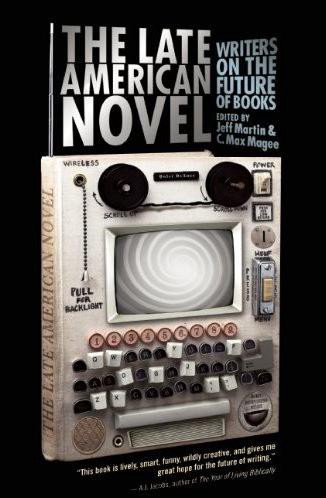An Excerpt From "The Late American Novel": The Best Books Will Be Written Long After You Are Dead
by Rudolph Delson

This essay is from the new collection The Late American Novel: Writers on the Future of Books, co-edited by Jeff Martin and C. Max Magee, of The Millions. In the book, Jonathan Lethem, Rivka Galchen, Nancy Jo Sales and many others consider the landscape as the literary world faces a sudden change in the way we buy, produce and read books.
Say it was 1910, and say on a breezy day you stopped me on Broadway, and say you asked me: “Sir, whither American letters?”
And say that the answer I gave you was fantastically correct. Say I predicted all about Modernism. Say I advised you to have your transatlantic agents ship you first editions of Dubliners (1914) and The Voyage Out (1915). Say I explained the plots and the modes of The Great Gatsby (1925) and The Sun Also Rises (1926) and The Sound and the Fury (1929), and say I did it incisively, with historical cross-references. Say I told you about, oh, Pearl Buck. And Saul Bellow and Toni Morrison. Say I even noted the late-century curios, the Room Temperatures (1990) and the Autobiographies of Red (1998). And say you were able to comprehend it all, not just the authors and the publication dates, but the meaning of all the millions: the mass migrations and the mass deaths and mass social movements, all the hours between Now and Then. How could you possibly have responded?
“Hum! Portnoy’s Complaint sounds worth the while. You say it will be published in 1969? I do hope I survive to read it. I trust you when you say that there will be an influenza and that there will be horrid world-wide wars, and even so — even in peace and health — it is hard to imagine I shall live another fifty-nine years. And what a shame, too, because Portnoy’s Complaint does sound ever so much better than House of Mirth. Or The Golden Bowl. To think, not only will there be a revolution, but it will be sexual.”
“Sir,” I would have said, “You can bide your time with Moby-Dick.”
“I have never heard of any such thing.”
“Moby-Dick! It was first published in 1851!”
“No, no, no. I have heard of no such thing.”
We would have tipped hats, dodged the horse carriages, gone our ways — and although everything I told you would have been true, none of it would have improved your breezy day.
But it is not 1910.
It is 2010.
And here we are on Broadway, and the day is balmy. And here I am in my timesuit, a chrononaut from the unhappy year 2110, speaking to you through the electrical mouthpiece of my helmet, trying to keep my alien accent in check:
“Pay attention in 2014; that year will witness the publication of the first non-linear e-novel. It will appear on the internet, and it will advance the technique of Edward Packard in the rarest way imaginable. I said: Edward Packard. You have not read Edward Packard? But he invented Choose Your Own Adventures! What do you mean, you haven’t read them? You have not ready any at all? But they were first published in 1979! Oh, it’s a disgrace worse than Melville. In 2014, these non-linear e-novels, these online Choose Your Own Adventures, they will put an end to sequentially fixed narratives, and to sequentially bound print-publishing. It will be quite the biggest literary event since Aeschylus, or anyway since Cervantes. Imagine if Proust had not had to fix his memories into any particular order: this is what will happen in 2014. Blossoms will bloom. And make certain to learn Spanish before 2021, because if you want to know anything about the American novel, you must read the works of Vilma Marielos Gonzalez Alvarado in the original. She will die young, of course — too young — when the tsunami from the first collapse of the Antarctic ice shelf scrubs out coastal California.”
Or whatever.
You have gathered my point: There is no pleasure in knowing about novels; the pleasure is in reading them, and for that you must wait. And my other point: That as racy and as witty as it is to lay bets about the future of literary schools, and the future of publishing economics, and the future of authorial demographics, there is no glory in such guesswork, there is no glory in parlor games; the glory is all in the elucidation of human fate in elevated speech, the glory is all in literature itself. And my final point: That to the extent they were not written before we were born, most of the best books will be written only after you and I are both dead.
Rudolph Delson lives in Brooklyn. He has won no prizes. The Late American Novel: Writers on the Future of Books
is available now at your favorite purveyor of books.
